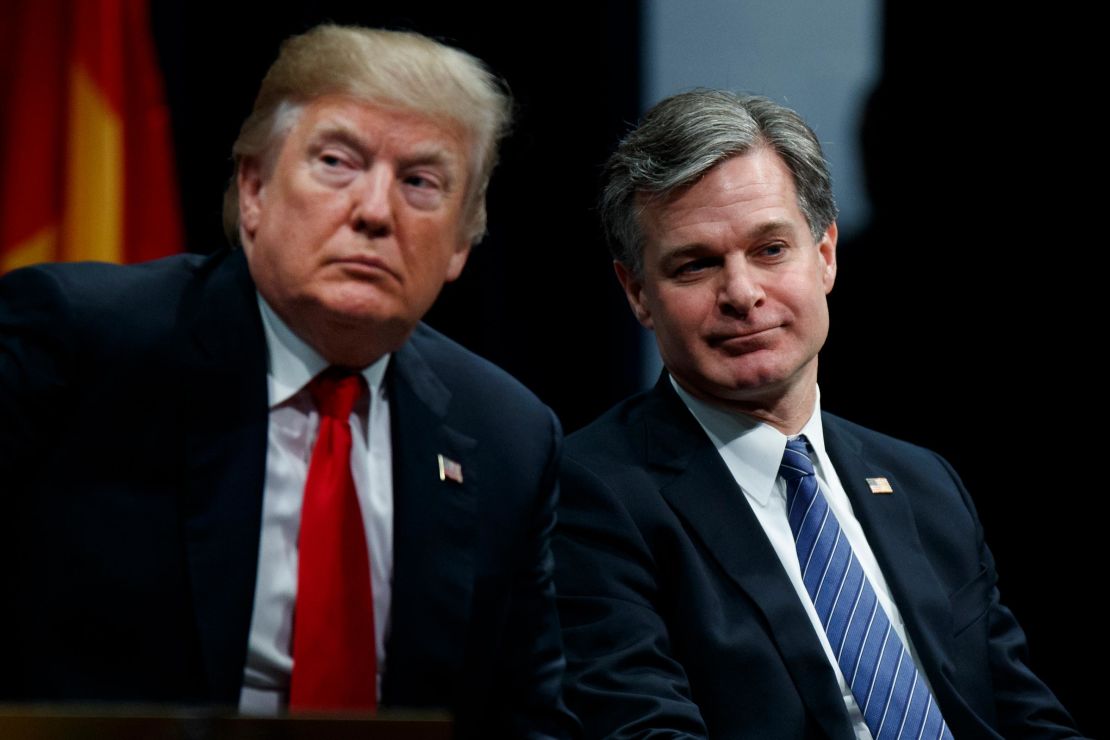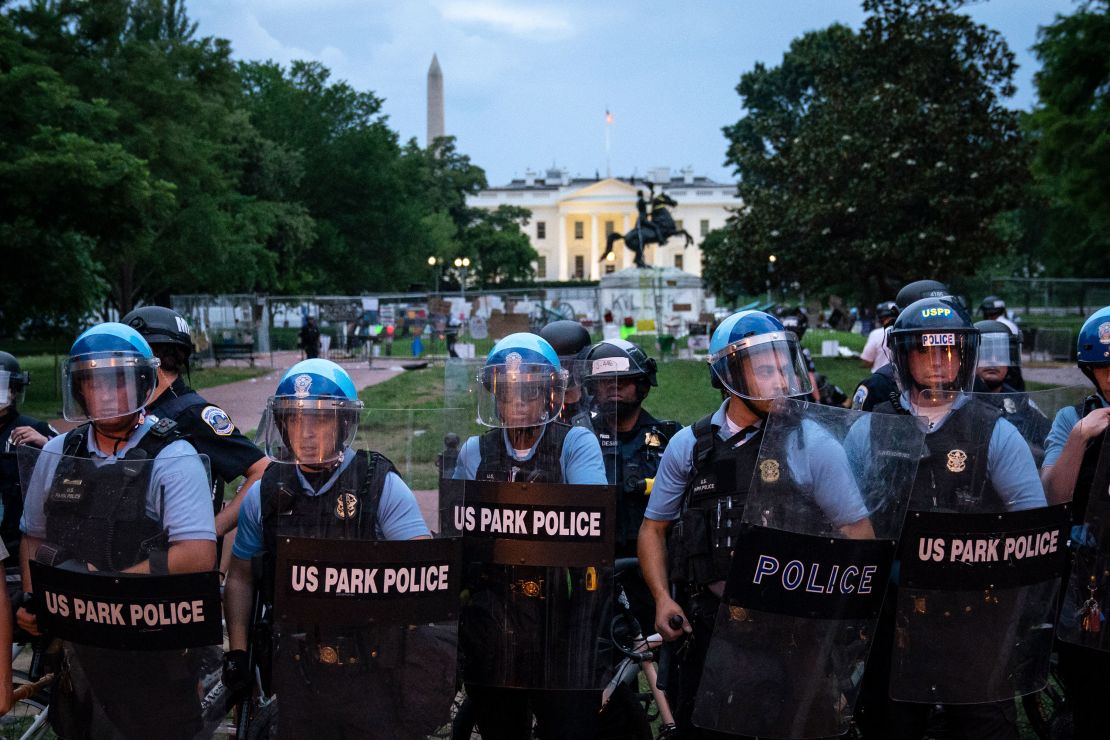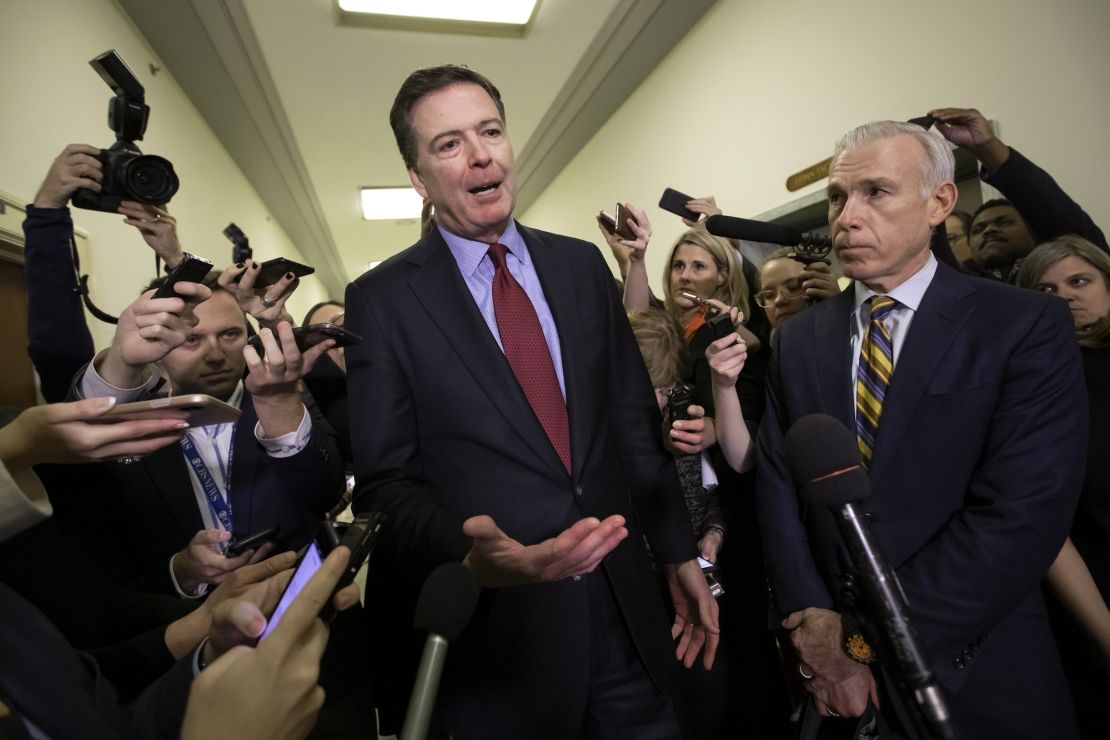When President Donald Trump was searching for a new FBI Director after firing James Comey in 2017, he wanted among other things someone who looked the part of America’s top law enforcement official.
Christopher Wray, a 50-year-old Yale-trained lawyer, was at the top of the list thanks to his conservative credentials as a leading partner at one of the nation’s biggest law firms and experience running the criminal division in George W. Bush’s Justice Department.
For Trump, who has always placed emphasis on people looking the part for their jobs, Wray’s square-jawed serious demeanor helped seal the deal, people close to the process told CNN at the time.
Soon after he became director, however, Trump began grousing that Wray wasn’t doing enough TV, people briefed on the matter said. Trump’s view was that the FBI director should be seen publicly supporting the president, who was in the middle of the Russia investigation into his campaign.
Years later, in the spring of 2022, Trump sent Wray a handwritten letter, according to one person familiar with the note, congratulating him on his recent appearance on “60 Minutes” in which Wray discussed Chinese espionage efforts directed at the US.
What Trump didn’t know at the time was that the FBI was beginning a criminal investigation, based on a referral from the National Archives, into his decision to hoard classified documents at Mar-a-Lago. The FBI court-authorized search of Mar-a-Lago that August led to a grand jury indictment against Trump — and ended any chance of Wray keeping his job in Trump’s second term.
“He invaded my home,” Trump said on NBC’s “Meet the Press” this week, lambasting the director he chose. “He invaded Mar-a-Lago.”
As Trump prepares to replace Wray with Kash Patel, a MAGA acolyte who has joined the president-elect in vowing to use the Justice Department to target political adversaries, Wray’s departure marks a clear end to a decadeslong era of independence for the FBI.
When he first hired Wray, Trump’s expectations of unbridled fealty, a loyalty standard that Comey has said Trump also asked him to meet, were a sharp departure from the culture of the modern FBI, which has assiduously cultivated its independence since the Watergate scandal and the abuses of the 48-year reign of J. Edgar Hoover. It’s an independence that has irritated almost every president through the years.
A tenure filled with tension
Compared to Comey, whose frequent media appearances caused some of the bureau’s problems, Wray preferred to keep a lower profile and avoided the press. That was not the type of director Trump was anticipating, according to senior administration officials.
That mismatch in expectations helped create a tightrope Wray tried to walk during Trump’s first term, as he limited his direct interactions with Trump while focusing on priorities that were important to the administration.
Wray is “an ideal person to run the FBI because he recognizes it’s a non-partisan job and he has the respect of the troops,” said a former Justice Department official who helped push for Wray’s hiring.

While Trump and Republicans rail against the so-called weaponization of the bureau, the former official said, “Kash Patel is exactly what Trump says he doesn’t want in an FBI director: someone who is going to weaponize the FBI.”
Wray’s tenure under Trump was punctuated by periods of significant tension. Unhappy about the investigation into Russian meddling in the 2016 election, and eventually their failure to support his claims of fraud in the 2020 election, Trump would often lash out at Justice officials, including at times at Wray.
At least twice, Wray told aides that he was prepared to resign over Trump’s demands, according to a former US official briefed on the matter.
“A couple times, it got to where he said ‘I’m not going to do that,’ and he was persuaded to stay,” the former US official said.
A current senior FBI official said that employees are frustrated that some of the attacks against the bureau and Wray were for decisions by their bosses at the Justice Department, which the FBI sometimes disagreed with.
Early in the Biden administration, for example, the Justice Department issued a memo suggesting parents protesting at school boards over Covid measures could be investigated if they made threats. The FBI distanced itself from the memo, which never produced any actual investigations. But the damage was done, and Republican lawmakers continue to cite the issue as an example of overreach.
FBI command center in 2020
The pressures on Wray came into clear view in June 2020, days after riots erupted across the country following the police killing of George Floyd.
Wray, along with Vice President Mike Pence and Attorney General Bill Barr, stood in the FBI’s command center in downtown Washington, DC. After riots swelled around the city, a few blocks away a fire was set in the basement of historic St. John’s Church as protesters gathered in Lafayette Square outside the White House.
Barr took charge of the law enforcement response and ordered 150 FBI agents into the square to clear protestors that night, according to a person present, despite some agents raising concerns that FBI agents aren’t trained to do crowd control, noting the risk that an agent or a protester could be killed.
The decision was made and agents were deployed to patrol the streets of Washington.

Wray later apologized to agents, noting that orders weren’t coming from him or even Barr, but from Trump, according to the person present at the command post.
Days later Wray spoke at a press conference alongside Barr and for the first time appeared to endorse the idea that Antifa was behind the violence, something Trump had been insistent on despite a lack of evidence to support his claims.
“We’re seeing people who are exploiting this situation to pursue violent extremist agendas,” Wray said. “Anarchists like Antifa and other agitators. These individuals have set out to sow discord and upheaval rather than join in the righteous pursuit of equality and justice.”
Inside the bureau, some officials were surprised that Wray had come to echo Trump and Barr’s claims about Antifa. But Wray’s words, temporarily at least, served to help bolster Trump’s confidence that Wray and the FBI were doing what he wanted. Months later at a congressional hearing, Wray told lawmakers that Antifa was an ideology, not a group, prompting criticism from Republicans.
A more understated director
At the bureau, where Comey was well-liked as director, Wray’s arrival in 2017 was a sharp turn. But it was a welcome one for employees who hoped that a more understated director would lower the political heat on the bureau and refocus attention on its national security and criminal enforcement missions.
Visibly uncomfortable in large crowds, Wray has a political gift in smaller gatherings, particularly rank-and-file employees who rarely get face time with the director, current and former FBI officials said.

When he spoke to graduating classes of new agents at the FBI academy in Quantico, Virginia, Wray often compared the teamwork aspect of being an FBI agent to being on a rowing team, invoking his own time as a Yale crew team member. For each graduating class, Wray would eat lunch at the cafeteria with six to eight students who were viewed as leaders of their class, a former FBI agent who admires Wray told CNN. Like he did for all his meetings or when he was a trial attorney, Wray was known to prepare before even small gatherings at the academy.
“He’s not a guy who works on emotion, he is very tactical, very prepared,” the former agent said.
Former senior FBI officials said that while Wray didn’t like to speak publicly in the media, he was good at building relationships with local law enforcement agencies and with private sector companies that the FBI needs for its national security and counter-terrorism efforts.
He often insisted to speak directly to current and former employees struggling with bereavement or health issues, notably former FBI employees suffering from post-9-11 illnesses. Every time a police officer was killed on duty anywhere in the US, Wray made calls to their family or police chiefs.
“I cannot tell you how many deathbed calls he has made,” the former US official said.
Decision to step down
After Trump announced his intention last month to replace Wray with Patel, Wray wrestled with how to leave the bureau he had helmed for nearly eight years. He struggled with whether it was better for the FBI and its tradition of independence to stay and be fired, or to leave before Trump’s arrival to save the bureau from further attacks, people close to his thinking said.

Ultimately Wray decided to announce his plans to resign to hundreds of FBI employees at the Washington, DC, headquarters, saying he would leave before Trump took office. His speech tacitly acknowledged the political headwinds the FBI will face under the new presidency.
Wray also took the time during the speech to highlight the accomplishments by his agents throughout his years there, from thwarting terror plots to stopping cyber-attacks on US infrastructure and hospitals, fentanyl seizures and rescuing children from predators.
“An awful lot of people are alive today because of your tireless efforts ,” Way told the audience. “As daunting as all that may sound, I’ve got enormous confidence in you and your ability to continue to meet the threats coming over the horizon.”
Under Wray, the FBI stopped numerous foreign hacking operations from countries like China and Russia, alleged Iranian plots to kill current and former government officials, and opened up the largest investigation in FBI history, charging more than 1500 people in connection to the January 6, 2021, US Capitol attack.
Still, none of it was enough to save Wray, whose tenure ends the same way as Comey’s – with Trump angry about being investigated by what he sees as his own FBI.





